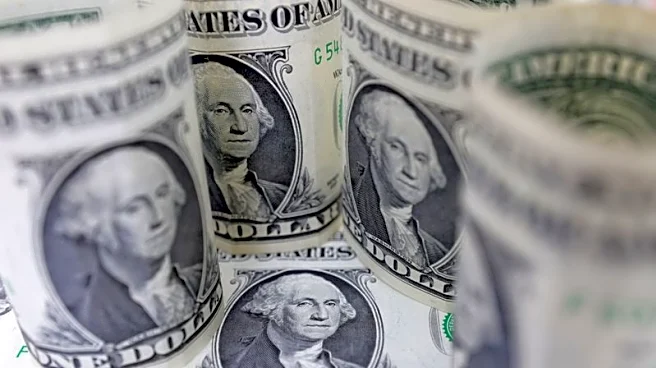By Gregor Stuart Hunter
SINGAPORE (Reuters) -The U.S. dollar rose to its strongest levels in six weeks in early Asian trading on Wednesday as risks around the U.S. government shutdown intensified, sparking
fresh investor worries and boosting demand for safe haven assets. The dollar index, which measures the greenback's strength against a basket of six currencies, rose 0.50% to 98.616, its highest level since 27 August, as U.S. President Donald Trump threatened to carry out mass firings of federal workers during the standoff. "With no resolution to the government shutdown in sight, sentiment in financial markets deteriorated," analysts from Westpac wrote in a research report. With the shutdown entering its second week, the probability of an end to the shutdown within the next week stands at 26%, according to the betting site Polymarket.
The yield on benchmark 10-year Treasury bond edged up to 4.1307% compared with its U.S. close of 4.127% on Tuesday. The Federal Reserve is still widely expected to lower interest rates later this month, with Fed funds futures implying a 94.6% probability of a 25-basis-point cut, according to the CME Group's FedWatch tool. Precious metals markets recorded fresh highs as investors sought safe havens, with U.S. gold futures breaching the $4,000 per ounce milestone on Tuesday. "Uncertainty about the global economy is one of the main drivers, and the U.S. government shutdown isn't exactly helping sentiment either," analysts from ING wrote in a research note. Against the yen, the dollar was trading at 152.205 yen, up 0.2% from late U.S. levels and hovering near the strongest level since February, as investors weigh up the impact of Sanae Takaichi's economic policy settings.
Takaichi, who surprised markets by winning the ruling party's leadership election over the weekend to become Japan's next prime minister, has left investors wondering whether the protégé of the late Shinzo Abe could usher in similar stimulus policies that may boost stocks but leave the yen fragile.
The kiwi traded at $0.5801, little changed before the Reserve Bank of New Zealand's policy decision later in the day. The central bank is widely expected to ease monetary policy, but markets are split on whether it will cut by 25 basis points or 50 basis points to revive a weakened economy. The Australian dollar was unchanged at $0.65836. The euro stood at $1.1655, steady so far in Asia, while sterling was at $1.3429, up 0.1%. The offshore yuan fetched 7.1469 yuan per dollar, trading flat compared with the previous session.
(Reporting by Gregor Stuart HunterEditing by Shri Navaratnam)










